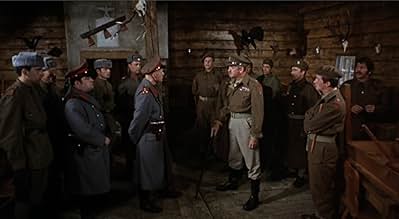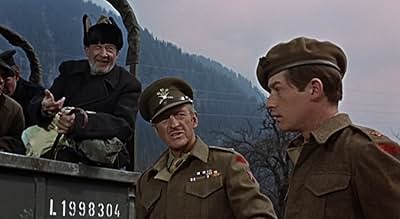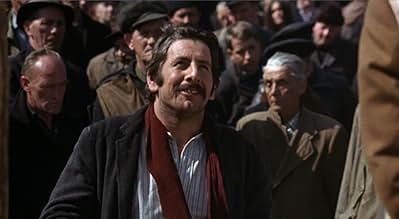After World War II, in an Austrian camp for displaced people, an interpreter mediates between the British and the Soviets regarding the fate of various refugees.After World War II, in an Austrian camp for displaced people, an interpreter mediates between the British and the Soviets regarding the fate of various refugees.After World War II, in an Austrian camp for displaced people, an interpreter mediates between the British and the Soviets regarding the fate of various refugees.
Hana Maria Pravda
- Beata
- (as Hana-Maria Pravda)
- Director
- Writers
- All cast & crew
- Production, box office & more at IMDbPro
Featured reviews
This isn't really a comedy, despite it's billing in TV guides and some boisterous parts in the first half of the film. It is really a drama that tries to tell a story about different characters trying to make the best of their circumstances, amidst the near-chaos of post-war eastern Europe.
The backdrop and the sub-text of the film is that this is the preamble before the 'winter' of the cold war sets in; an unhappy state of affairs that suits no-one.
There is a fine cast in this film and it is mostly well-made. The camerawork uses a fair amount of the (then novel) zoom lens which is a little distracting, but not as distracting as some hand-held camerawork; an early example of 'shaky camera' for effect. Yeah, we get the point after ten seconds, we don't have to made ill by watching this for several more minutes, do we...?
If asked to criticise the casting and the acting performances, I can't help but think that Niven plays it a bit too straight, and that say, (a younger) Alec Guinness might have done a better job of it. But I am quibbling really; this is a pretty good film, well worth watching.
The backdrop and the sub-text of the film is that this is the preamble before the 'winter' of the cold war sets in; an unhappy state of affairs that suits no-one.
There is a fine cast in this film and it is mostly well-made. The camerawork uses a fair amount of the (then novel) zoom lens which is a little distracting, but not as distracting as some hand-held camerawork; an early example of 'shaky camera' for effect. Yeah, we get the point after ten seconds, we don't have to made ill by watching this for several more minutes, do we...?
If asked to criticise the casting and the acting performances, I can't help but think that Niven plays it a bit too straight, and that say, (a younger) Alec Guinness might have done a better job of it. But I am quibbling really; this is a pretty good film, well worth watching.
When the film was released, Columbia booked it as a 2nd feature. Personally, after trying to sit through it, the studio probably should have shelved it, not necessarily for content, but because that use of flashy zooms became so difficult to sit through that I headed for the lobby more than four times.
In this instance zoom meant zooming in - cut - zoom out - zoom in-cut-zoom out all the way through the film.
The use of zoom lenses in motion pictures was a new tool for filmmakers at the time, but its application here made the film impossible to sit through, at least in a theatre. Until now, thought it had all but disappeared forever.
Not sure if time has changed any of this.
In this instance zoom meant zooming in - cut - zoom out - zoom in-cut-zoom out all the way through the film.
The use of zoom lenses in motion pictures was a new tool for filmmakers at the time, but its application here made the film impossible to sit through, at least in a theatre. Until now, thought it had all but disappeared forever.
Not sure if time has changed any of this.
David Niven stars in this rather unremarkable post-war comedy drama set in an Austrian camp that sorts out and repatriates displaced people. He leads the British contingent with Ori Levy ("Capt. Kamenev") his Russian counterpart with whom he has an uneasy sort of truce. Topol is their charismatic interpreter/peace broker "Janovic" who oils the wheels of their procedures - but he has a secret and when Niven and the Russian find out, he finds life becomes quite precarious. The comedy struggles, to be honest - Niven tries hard, but Topol too hard - neither seem to really want to be here. The presence of the naively optimistic young "Lieut. Pilkington" (John Hurt) and the cynical "Brig. Bewley" (Anthony Quayle) - who is aware of an incident in Niven's past, suggests that there is an underlying message in the film, but nothing really hits home. There are duty versus compassion clashes, and imperialist versus communist ones too - but the setting and characterisations don't support any real substance to these, and the films flails a bit before an ending that is surprisingly robust.
Following the abysmal 'Eye of the Devil' J. Lee Thompson and David Niven have teamed up again for ths film set in a displacement camp. Faced with a veritable Tower of Babel the commanding officer Major Burnside is sorely in need of an interpreter but is sent someone who knows only Ancient Greek and Latin. Luckily he stumbles upon a prisoner who is multi-lingual. Burnside turns a blind eye to his probably being a deserter but then his Russian counterpart starts to ask questions.......
Music can make or mar a film and the score by Ron Grainer is terminally irritating. The scenes between the Cockney and Russkie soldiers are decidedly naff. As for the principals Topol is okay as the interpreter but his appeal has always eluded me. Anna Karina's talent and beauty transcend a thankless role and Anthony Quayle is brilliant as a Brigadier who calls to mind Peter Ustinov's observation that 'the Army is the final repository of the fool'. The film really belongs to Niven. It is not at all unusual to see him in uniform but behind his character's military persona there is a resignation and world-weariness which is very touching. Decidedly one of his best post-Oscar performances. This film should have been better but is alas another of this directors near misses.
This film is set in post WWII occupied Austria that is split into zones run by the French, British, American and Russians respectively. Millions of people are displaced and refugee camps are formed in places like Austria to distribute refugees to places in this film like Linz and the West or Freistadt and eventually Russia.
It has elements of light comedy as the by the book British Major Burnside (David Niven) forbids 'fraternization' as he calls it but everybody seems to end up naked and frolicking in bed. Was I watching a Carry On film! Several border disputes with the Russians also provide more comic scenes including a border line that separates an alm establishment! The plight of the refugees has a more serious tone to proceedings.
Chaim Topol plays a character called Janovic, one such refugee but with a special 'talent' of interpreting several languages that proves useful to Burnside in dealing with the Russians in border disputes and such like. Topol steals the film for me with his comic touch and serious acting in other scenes.
Eventually it is revealed that Janovic is a deserter from the Russian army and to avoid a dispute with the allied (at the time) Russians is ordered to be returned to them, and probable death. Hardly comedic and that's one of the serious strands and very tragic ones.
Another serious strand is the story of Major Burnside during the War and the reason he has been placed at such outposts as this and later it transpires Indonesia.
A solid cast featuring the likes of David Niven, Topol, a young John Hurt, Anthony Quayle. Not a bad list and the film probably deserves greater recognition.
It has elements of light comedy as the by the book British Major Burnside (David Niven) forbids 'fraternization' as he calls it but everybody seems to end up naked and frolicking in bed. Was I watching a Carry On film! Several border disputes with the Russians also provide more comic scenes including a border line that separates an alm establishment! The plight of the refugees has a more serious tone to proceedings.
Chaim Topol plays a character called Janovic, one such refugee but with a special 'talent' of interpreting several languages that proves useful to Burnside in dealing with the Russians in border disputes and such like. Topol steals the film for me with his comic touch and serious acting in other scenes.
Eventually it is revealed that Janovic is a deserter from the Russian army and to avoid a dispute with the allied (at the time) Russians is ordered to be returned to them, and probable death. Hardly comedic and that's one of the serious strands and very tragic ones.
Another serious strand is the story of Major Burnside during the War and the reason he has been placed at such outposts as this and later it transpires Indonesia.
A solid cast featuring the likes of David Niven, Topol, a young John Hurt, Anthony Quayle. Not a bad list and the film probably deserves greater recognition.
Did you know
- TriviaAlysoun Austin's feature-film debut, playing the role of "A.T.S. Driver."
- GoofsThe John Hurt character (Lieutenant Pilkington) has long hair, like John Lennon, not in keeping with British army regulations.
- Quotes
Major Burnside: What languages do you speak?
Janovic: Russian, Polish, Greek, Hungarian, German, Romanian, Bulgar, Serbo-Croat, Romani, Italian, some Arabic, some Yiddish, a little Chinese.
- Crazy creditsOpening credits prologue: OCCUPIED AUSTRIA SPRING, 1945
- How long is Before Winter Comes?Powered by Alexa
Details
- Runtime
- 1h 43m(103 min)
- Aspect ratio
- 1.85 : 1
Contribute to this page
Suggest an edit or add missing content





































